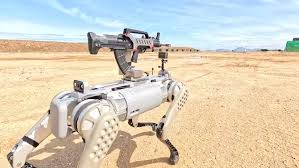Despite the fact that robotic dogs are becoming more common in Chinese cities, businesses have reported that movies depicting the robots using firearms in military drills shocked them.
Robotic dogs are becoming increasingly common in parks across China, from Beijing to Hangzhou. This trend is expected to continue.
Josh Yuan demonstrated his robo-dog to us in one of the most upscale shopping districts in Beijing. He used a handheld remote-controlled gadget to guide the robo-dog through the swarm of inquisitive bystanders throughout the demonstration.
A few months ago, he purchased his new buddy for the sum of £1,300.
“I think at the moment it’s for people like me, or tech geeks and programmers,” Mr. Yuan stated to reporters.
“But I think in the future, it will be quite common, and humanoid robots will definitely enter people’s homes when they are more affordable.”
China is home to a large number of enterprises that sell robots. A handful of them, such as the company Unitree, which is based in Hangzhou, are concentrating on robotic dogs.
The Unitree team displayed their two most recent models to the public. As an example, there is a little dog that may be employed as a friend or made up in a dragon or panda costume for the purpose of having fun.
In addition to that, they have a larger model that is powerful enough to carry me on its back.

It is made for business use and can carry supplies, be sent to a fire or disaster, or be used to check infrastructure and pipelines.
But in May, robodogs got extra attention that wasn’t good for them when China’s state media showed them being used in training drills with weapons firing from their backs.
The People’s Liberation Army trained with Cambodian forces while these robots with guns were around. They say the video was a surprise, though.
Duke Huang, the marketing manager for the business, said, “Like everyone else, we found out about this video on the internet.” Before that, we didn’t know anything about it.
These robots were the focus of the video, but the military is not the intended use for them.
“We can’t control how buyers use the dog after they buy it,” he says. “But we are thinking about how to prohibit military use in the future.”
Robot dogs could be the next thing used on the battlefield after drones. This is not what Unitree thinks.
Mr. Huang says, “The dog is not that smart; it’s very simple.” “It still needs my help to move. It’s not smart.
“Almost every advance made with AI and robotics in the civilian economy is being mirrored on battlefields,” says P. W. Singer, a strategist at the US think tank New America who focusses on warfare in the 21st century.
He says “many of the uses of AI and drones in wars like Ukraine and Gaza are almost direct applications of civilian tech” .
“This is just the beginning,” Mr. Singer says. “The technology being used now is from the early stages; it’s like the biplane in World War I compared to what aeroplanes would become.”become.”
Canines that are powered by machines are still considered a curiosity or a toy in a world that is far removed from conflict.
In addition to being able to roll over, shake your hand, and bark out a few phrases in either English or Chinese, they are capable of reaching a top speed of sixteen miles per hour.
When viewed from the streets of China’s most prosperous and technologically advanced cities, however, these robodogs evoke a sense of wonder.
An individual named Silver, who resides in Hangzhou, remarked, “When I first saw it, it was magical.”